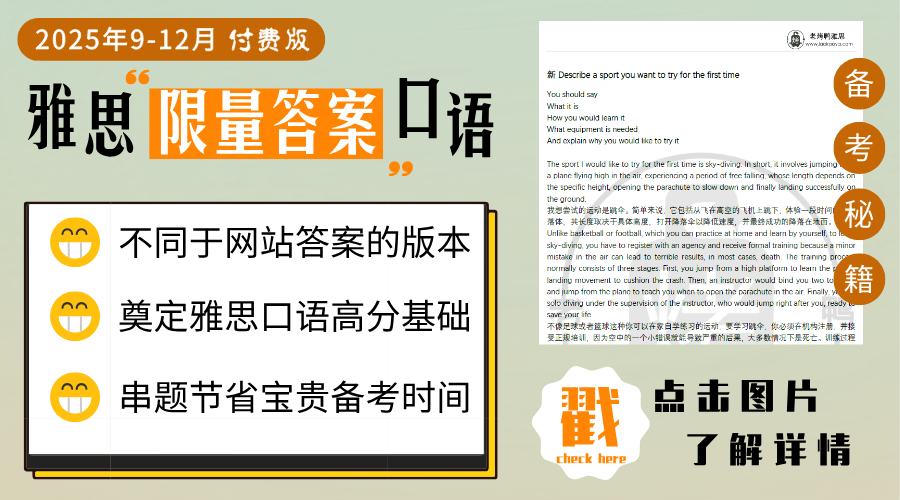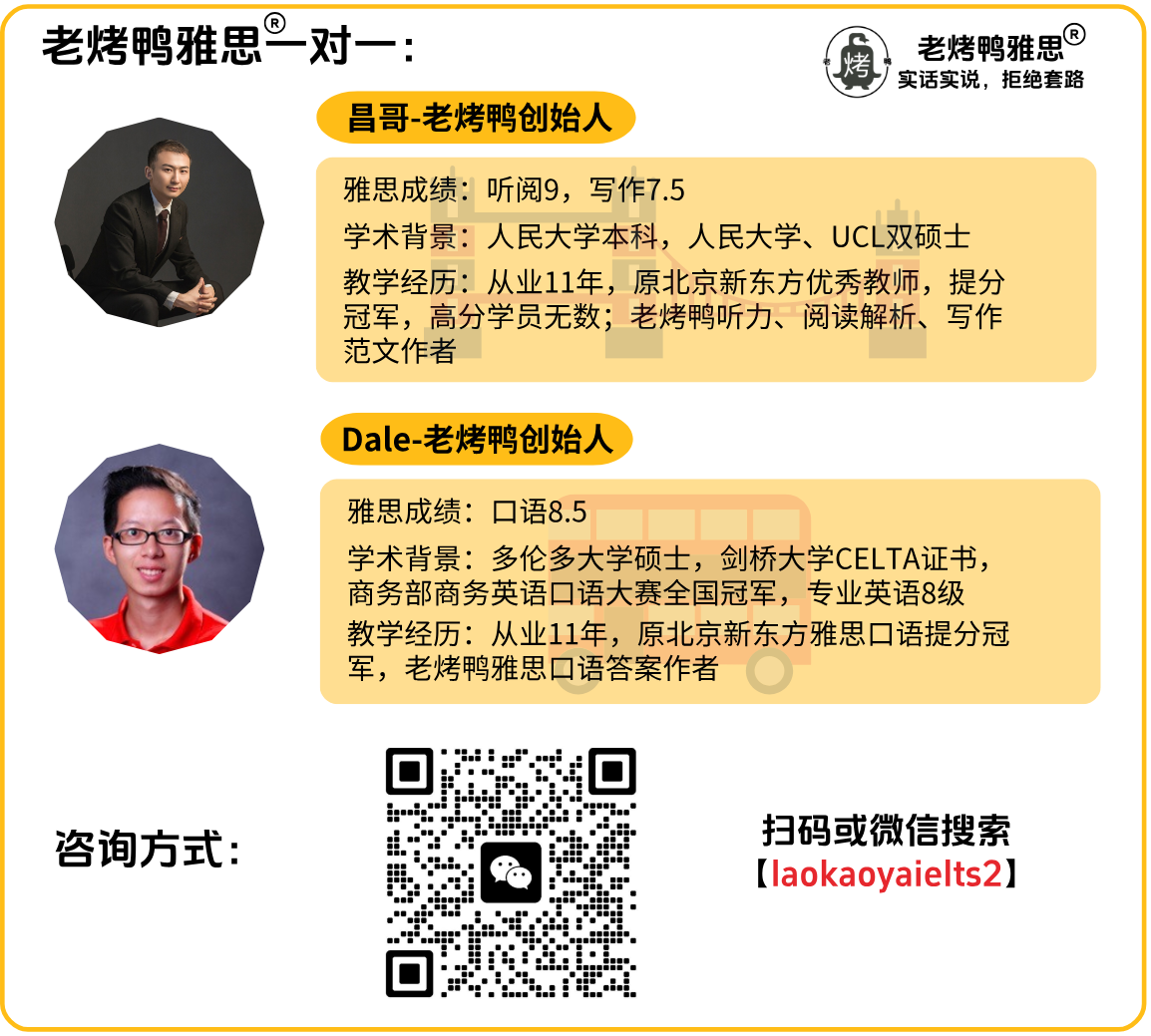剑桥雅思16Test4Passage2阅读原文翻译 Changes in reading habits 阅读习惯的改变
剑桥雅思16阅读第四套题目第二篇文章的主题为阅读习惯的改变。文章一共9段,大体介绍了新的阅读媒介,以及这些媒介对我们阅读能力和脑回路的负面影响。这篇文章较为抽象,需要大家拥有一定的背景知识才好理解。下面是具体每一段的翻译。
点击查看这篇雅思阅读具体题目的答案解析与其中出现的高频词汇:
雅思阅读真题词汇 剑桥雅思16 Test 4 Passage 2 阅读习惯的改变
剑桥雅思16Test4Passage2阅读答案解析 Changes in reading habits 阅读习惯的改变
剑桥雅思16 Test4 Passage2阅读原文翻译
第1段
Look around on your next plane trip. The iPad is the new pacifier for babies and toddlers. Younger school-aged children read stories on smartphones; older kids don’t read at all, but hunch over video games. Parents and other passengers read on tablets or skim a flotilla of email and news feeds. Unbeknown to most of us, an invisible, game-changing transformation links everyone in this picture: the neuronal circuit that underlies the brain’s ability to read is subtly, rapidly changing and this has implications for everyone from the pre-reading toddler to the expert adult.
下次乘坐飞机的时候记得环顾四周。iPad已经成为婴儿和幼儿新的安抚物。年轻一些的学龄儿童在手机上看故事;年龄稍大一些的孩子则完全不阅读,只是低头玩游戏。父母和其他乘客要么在平板上看东西,要么浏览电子邮件和新闻。我们大多数人不知道的是,一场看不见的,天翻地覆的变化将这一情景中的每个人联系在一起:构成大脑阅读能力基础的神经回路正在发生微妙而迅速的改变。从尚不会阅读的幼儿到成年专家,它影响着每一个人。
第2段
As work in neurosciences indicates, the acquisition of literacy necessitated a new circuit in our species’ brain more than 6,000 years ago. That circuit evolved from a very simple mechanism for decoding basic information, like the number of goats in one’s herd, to the present, highly elaborated reading brain. My research depicts how the present reading brain enables the development of some of our most important intellectual and affective processes: internalized knowledge, analogical reasoning, and inference; perspective-taking and empathy; critical analysis and the generation of insight. Research surfacing in many parts of the world now cautions that each of these essential ‘deep reading’ processes may be under threat as we move into digital-based modes of reading.
神经科学方面的研究表明,6000多年前,读写能力的获取让我们种族的大脑中出现新的回路。从解码基础信息(如羊群中的山羊数量)这一十分简单的机制开始,该回路进化成如今十分精妙的、有阅读能力的大脑。我的研究描绘了当前拥有阅读能力的大脑如何使得一些我们最为重要的智力和情感发展成为可能,如知识的内化、类比推理与干预;态度取舍与共情;批判性分析和洞察力的产生等。如今世界许多地方进行的研究告诫我们,随着我们转向数字模式的阅读习惯,这些重要的深度阅读过程可能遭到威胁。
第3段
This is not a simple, binary issue of print versus digital reading and technological innovation. As MIT scholar Sherry Turkle has written, we do not err as a society when we innovate but when we ignore what we disrupt or diminish while innovating. In this hinge moment between print and digital cultures, society needs to confront what is diminishing in the expert reading circuit, what our children and older students are not developing, and what we can do about it.
这并不是简单的纸张对抗数码阅读与技术创新的二元问题。正如麻省理工学者Sherry Turkle所写的那样,我们的社会并不会在我们创新的时候出错,而是在我们忽略我们创新所打破或者消弭的东西时才会出错。在这一纸张与数码文化的承接时期,社会需要解决专业阅读回路中什么东西正在消失,我们的孩子以及年龄稍大的学生没有提升什么能力,以及我们对此能做什么。
第4段
We know from research that the reading circuit is not given to human beings through a genetic blueprint like vision or language; it needs an environment to develop. Further, it will adapt to that environment’s requirements – from different writing systems to the characteristics of whatever medium is used. If the dominant medium advantages processes that are fast, multi-task oriented and well-suited for large volumes of information, like the current digital medium, so will the reading circuit. As UCLA psychologist Patricia Greenfield writes, the result is that less attention and time will be allocated to slower, time-demanding deep reading processes.
我们从研究中得知,与视力或者语言不同,阅读回路并非通过基因蓝图被赋予给人类。它需要相应的环境才能发展。此外,它会适应环境的要求 – 从不同的书写体系到所使用的媒介的特点。如果主流媒介有利于快速、多重任务导向、以及适合处理大量信息的过程,比如当前的数码媒介,那么阅读回路也会这样子。正如UCLA心理学家Patricia Greenfield所写的那样,结果是更少的注意力和时间会被分配给速度较慢、需要时间的深度阅读过程。
第5段
Increasing reports from educators and from researchers in psychology and the humanities bear this out. English literature scholar and teacher Mark Edmundson describes how many college students actively avoid the classic literature of the 19th and 20th centuries in favour of something simpler as they no longer have the patience to read longer, denser, more difficult texts. We should be less concerned with students’ ‘cognitive impatience’, however, than by what may underlie it: the potential inability of large numbers of students to read with a level of critical analysis sufficient to comprehend the complexity of thought and argument found in more demanding texts.
越来越多来自教育者与心理学和人类学领域研究者的报告支持这一观点。英国文学学者和教师Mark Edmundson描述了有多少大学生会主动避开19世纪和20世纪的经典文学作品,反而选择一些更为简单的作品,因为他们不再拥有阅读更长、更密集、难度更大的文本的耐心。 我们应该更多的关注学生认知急躁背后的原因,而非这一现象:大量的学生没有能力在阅读中进行一定程度的批判性分析,从而理解要求更高的文本中所体现的复杂思想和争论。
第6段
Multiple studies show that digital screen use may be causing a variety of troubling downstream effects on reading comprehension in older high school and college students. In Stavanger, Norway, psychologist Anne Mangen and her colleagues studied how high school students comprehend the same material in different mediums. This article is from Laokaoya website. Mangen’s group asked subjects questions about a short story whose plot had universal student appeal; half of the students read the story on a tablet, the other half in paperback. Results indicated that students who read on print were superior in their comprehension to screen-reading peers, particularly in their ability to sequence detail and reconstruct the plot in chronological order.
许多研究表明,数码屏幕的使用可能对高中生和大学生的阅读理解能力造成各种各样令人烦心的负面影响。在挪威的斯塔万格,心理学家Anne Mangen和她的同事研究了高中生在不同的媒介下如何理解相同的材料。Mangen的团队询问实验对象有关一篇短小故事的问题。该故事的情节受到学生的普遍欢迎。其中一半学生在平板上阅读该故事,而另一半学生则在纸张上阅读。研究表明,相比于在屏幕上阅读的学生,在纸张上阅读的学生在理解方面更胜一筹,尤其是在他们按顺序排列细节并根据时间发展重构情节的能力方面。
第7段
Ziming Liu from San Jose State University has conducted a series of studies which indicate that the ‘new norm’ in reading is skimming, involving word-spotting and browsing through the text. Many readers now use a pattern when reading in which they sample the first line and then word-spot through the rest of the text. When the reading brain skims like this, it reduces time allocated to deep reading processes. In other words, we don’t have time to grasp complexity, to understand another’s feelings, to perceive beauty, and to create thoughts of the reader’s own.
圣何塞州立大学的Ziming Liu进行的一系列研究表明,阅读方面的新常态是略读,包括识别单词与浏览文本。如今,许多阅读者文章来自老烤鸭雅思在阅读时使用如下模式:首先看下第一行,然后只看剩余文本中的个别词汇。当阅读大脑这样略读的时候,它就会减少分配给深入阅读的时间。换句话说,我们没有时间领悟复杂的东西,理解他人的情感,欣赏美,或者产生读者自身的想法。
第8段
The possibility that critical analysis, empathy and other deep reading processes could become the unintended ‘collateral damage’ of our digital culture is not a straightforward binary issue about print versus digital reading. It is about how we all have begun to read on various mediums and how that changes not only what we read, but also the purposes for which we read. Nor is it only about the young. The subtle atrophy of critical analysis and empathy affects us all equally. It affects our ability to navigate a constant bombardment of information. It incentivizes a retreat to the most familiar stores of unchecked information, which require and receive no analysis, leaving us susceptible to false information and irrational ideas.
批判性分析、共情和其他深入阅读过程可能成为我们数码文化无意之间附带的牺牲品。这一可能性并不是简单的纸张对抗数码阅读的二元问题。它更多的是关于:我们所有人如何开始在不同媒介上阅读,以及这如何改变了我们阅读的内容和阅读的目的。它也不仅仅是关于年轻人的。批判性分析和共情不易察觉的衰退同等地影响着我们所有人。它影响我们在持续不断的信息轰炸中寻找出路的能力。它刺激我们退回到未经核验的、最熟悉的信息中。这些信息不需要、也没有经过分析,让我们很容易受到错误信息和不合逻辑的观点的影响。
第9段
There’s an old rule in neuroscience that does not alter with age: use it or lose it. It is a very hopeful principle when applied to critical thought in the reading brain because it implies choice. The story of the changing reading brain is hardly finished. We possess both the science and the technology to identify and redress the changes in how we read before they become entrenched. If we work to understand exactly what we will lose, alongside the extraordinary new capacities that the digital world has brought us, there is as much reason for excitement as caution.
神经科学中有一条不随时间变化的古老规则:用进废退。当应用于阅读大脑的批判性思维时,它是一条给人以希望的原理,因为它预示着选择。阅读大脑改变的故事还远未终止。我们拥有科学和技术能够在阅读方式的变化固化之前对其进行界定和矫正。如果我们尝试理解我们所损失的东西,以及数码世界带给我们的全新能力,那么我们就有相同的理由保持谨慎和兴奋。
剑桥雅思16Test4Passage1阅读原文翻译 Roman tunnels 罗马隧道
剑桥雅思16Test4Passage3阅读原文翻译 Attitudes towards Artificial Intelligence 对待人工智能的态度





